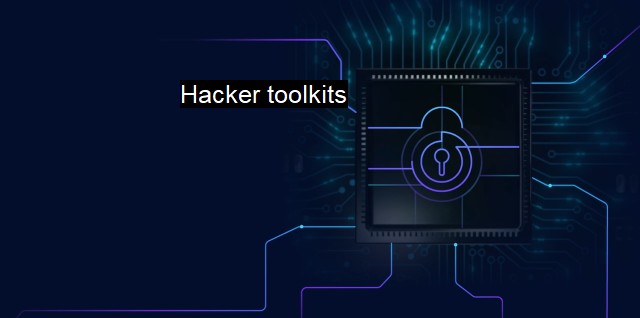What are Hacker toolkits?
Understanding the Hackers Toolkit: Techniques and Tools for Cyber Espionage and Criminal Financial Gain
"Hacker toolkits" commonly refer to the collection of software tools widely used by hackers to exploit security vulnerabilities, gain unauthorized access, and potentially cause harm to computer systems and networks. These packages can be highly flexible, allowing hackers to customize their approach based on the target's distinct vulnerabilities. The context in which hacker toolkits are often discussed is cybersecurity and antivirus, so it’s essential to have an idea of these tools' various features and how they operate to build an adequate defensive strategy.Hacker toolkits can include various instruments or software, each designed to exploit different security flaws or weaknesses. Some common components in these toolkits can range from password crackers, network mappers to fill in a comprehensive map of network topology, packet sniffer for eavesdropping on network traffic, rootkits for gaining administrator-level access, and keyloggers for recording and transmitting user-specified keys. With destructive potential at their fingertips, hackers leverage these tools to inflict maximum damage by bypassing system security and manipulating data to the desired outcome.
One notorious example of a hacker toolkit is Metasploit. This open-source project provides valuable information about security vulnerabilities and aids in penetration testing and IDS signature development. its accessibility also means it can be in the wrong hands misused for malicious purposes.
Despite their ill repute, hacker toolkits can also serve a constructive purpose. Security professionals use these tools to probe their networks and systems, identifying and addressing vulnerabilities before malicious hackers can exploit them. In this sense, these toolkits provide an avenue to commit ethical hacking, essentially improving security measures.
While hacker toolkits pose a significant threat to cybersecurity, antivirus solutions play a significant role in countering these negatives. Antivirus software attempts to identify, catch, and neutralize viral software that finds its way into your system, protecting from harmful hacker toolkits.
To safeguard against hacker toolkits, an antivirus solution typically maintains an extensive database of known security threats and employs a method referred to as "heuristics" to identify new or altered forms of existing dangers loaded with previously unseen malicious code. When a hacker toolkit targets a specific vulnerability or uses a particular mode of action, this pattern can be recognized by a well-configured antivirus, which will then take preventive measures.
Beyond having an antivirus solution, the need for a holistic approach towards cybersecurity is undeniably paramount. This includes keeping computer systems and software updated, ensuring patches for known vulnerabilities are integrated as soon as possible, harden network hardware configurations to minimize the risk of intrusion, regular audits of system logs for anomalous behavior, implementing tight access control measures, and training users about potential threats and secure online practices.
Also, regular ethical hacking and penetration testing can be a strategic proactive measure. Since ethical hackers use the same toolkits as their malicious counterparts, they can test the systems using these tools and, based on the results, secure the system’s loopholes, rendering it less susceptible to real threats.
As hacking techniques grow more sophisticated, cybersecurity measures continually need to evolve to match pace. While hacker toolkits encapsulate potential digital mayhem, their constructive use presents a could be tool for fortification. Understanding these toolkits' nature can better equip organizations to stay vigilant, enhance their security measures, and make their digital fortresses impervious to attacks, thus emphasizing the importance of a proactive and enlightened approach in the field of cybersecurity.

Hacker toolkits FAQs
What are hacker toolkits?
Hacker toolkits are a collection of software tools used by cybercriminals to exploit vulnerabilities in computer networks, systems or software.Are hacker toolkits illegal?
Yes, using hacker toolkits for malicious purposes is illegal and can result in severe legal consequences.Can antivirus software detect and prevent hacker toolkits?
Antivirus software can detect and prevent some types of hacker toolkits, but not all of them. Cybercriminals are constantly developing new toolkits that are designed to evade detection by security software.How can I protect my computer from hacker toolkits?
You can protect your computer from hacker toolkits by using up-to-date antivirus software, keeping your operating system and software updated with security patches, avoiding suspicious websites and emails, and being cautious when downloading software or files from the internet.| | A | | | B | | | C | | | D | | | E | | | F | | | G | | | H | | | I | | | J | | | K | | | L | | | M | |
| | N | | | O | | | P | | | Q | | | R | | | S | | | T | | | U | | | V | | | W | | | X | | | Y | | | Z | |
| | 1 | | | 2 | | | 3 | | | 4 | | | 7 | | | 8 | | |||||||